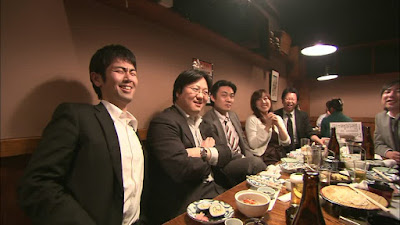Japan with Joanna, Part 1
Tokyo: capital of Japan, one of the most important global business hubs, and, with over 37 million residents, the largest metro area in the world. That's like putting nearly the entire state of California--LA, the Bay Area, San Diego, the whole lot--into one city! If the Tokyo metro were a separate country, it's GPD would be larger than Italy (it would be the 8th largest in the world).
Maybe you don't like statistics as much as I do. Even if the numbers don't awe, most who go are impressed with Tokyo's nightlife, convenient public transportation, shopping, dining, cleanliness, and hospitality. What's not to like? If you're a country boy, the crowds may be overwhelming, but regardless I'd recommend a visit.
Why am I writing about Tokyo? Well, if you recall from my last post, I'm back at home in Ohio. At the end of June my contract ended in Hangzhou, so it was time for me to say adios to China. Before heading back to the old US of A I stopped in Japan for a week. I'd been twice before--once on Semester at Sea, and once with my friend Andrew (you can read all about it on this very blog)--but I wouldn't pass up an opportunity to go again. Joanna had never visited Japan, so it seemed as good a time as ever to go together.
 |
| With the Semester at Sea crew in Japan back in 2008 |
I loved Tokyo the first two times, and the third certainly didn't disappoint. I was so impressed that after visiting with Andrew I'd looked for jobs in Japan. I also applied for a semester long position this past spring. Ultimately I decided to stay in Hangzhou, which was a good decision (for several reasons). Traveling in Japan is great--expensive, but great--although working there would be a different animal altogether.
 |
| White shirts and ties are ubiquitous throughout Tokyo (many are allowed to ditch the suit coat in the oppressive summer heat) |
The government has tried to limit working hours and push for better work-life balance, and some people work reasonable hours, but the problem persists. Most overtime in Japan is unpaid, and company culture can be stubborn. It's hard to know how many people are worked to death. Officially there are only a few dozen cases a year, but throw in suicide related deaths, and the real figure is probably much higher.
 |
| In addition to long hours, many businessmen are encouraged (borderline forced) to go out drinking after work. It's possible for women to land these jobs, but men still far outnumber them. |
This is from Wikipedia; not the best source I know, but it comes from the International Labour Organization, which gives four typical work death cases:
- Mr. A worked at a major snack food processing company for as long as 110 hours a week (not a month) and died from a heart attack at the age of 34. His death was recognized as work-related by the Labour Standards Office.
- Mr. B, a bus driver, whose death was also recognized as work-related, worked 3,000 hours a year. He did not have a day off in the 15 years before he had a stroke at the age of 37.
- Mr. C worked in a large printing company in Tokyo for 4,320 hours a year including night work and died from a stroke at the age of 58. His widow received workers’ compensation 14 years after her husband's death.
- Ms. D, a 22-year-old nurse, died from a heart attack after 34 hours of continuous duty five times a month.
Here's the link to the wiki page, which has some solid articles in the footnotes. This subject is fascinating to me, but I won't babble on any longer; check out the site if you want more info.
Again, it's not like everyone is slumping over at their desks from a heart attack at 40. But simply that the word Karōshi exists illustrates how intense working in Japan can be.
But back to the positive side of Japan...there's so much to enjoy! As for me, I was happy just to visit and be a typical tourist. And since it was Joanna's first time, we saw many of the touristy spots. After typing this out I realized it's too long for only one post, so I'll wait for next time to go more in depth about several of the city's famous neighborhoods that we explored.




Comments